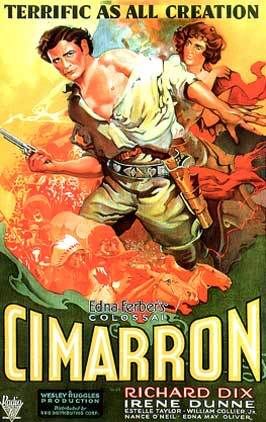
Winner "Best Picture" in the 1930/31 Academy Award Ceremony
Technically the first Best Picture, since this was the year that the category changed from Best Production to Best Picture
Admittedly, I think I was sort of putting off watching this movie. I mentioned before that I'm not much of a fan of war movies. Well, on that note, I'm probably even less of a fan of Westerns, particularly of the traditional variety. I watched this about a week ago in two sittings. I made most of my notes for this blog entry then, but I'm just now getting a chance to sit down and finish it now.
There's a lot in this movie that's challenging, complicated, complex. I feel like the filmmaking and the acting probably aren't doing justice to Edna Ferber's text, but of course I can't say that for sure unless I read it. It was a difficult film for me to make it through, and I had to watch it in sessions, because I honestly just wasn't all that into it. I can see why people call it one of the weakest Best Picture films in the history of the Academy Awards. But there were occasional moments that were really good, like the moment of true pathos that takes place in the Cravat family following a big gunfight in the street. It achieves a glimmer of a great film at least when the family stops suddenly in mid-conversation, and you see Sabra Cravat's face as she looks through a doorway, discovering the thing that the viewer has already known -- the family's loyal servant, the young black boy Isaiah, the stowaway on their adventure west to Oklahoma, has been shot in the street while looking for the family's five-year-old son. You knew they would discover it, but you didn't know for sure they would be so struck by it, and you certainly didn't expect what happened next, for him to be carried in by the tiny, much-harrassed Sol, the only Jew in town, the marginalized Other carrying in yet another marginalized Other, a tender unexpected Pieta, this sad burden passed from Sol to Yancey, who throughout the film is slowly becoming an ever-increasing voice of justice for any outcast at the time, whether black, Jew, Native American, or madam.
The character may have been intended to be a voice of justice, but as a leading man, Richard Dix just wasn't at all compelling -- that was definitely a major drawback for me in this film. I found him hard to sympathize with, when theoretically, he should have been my favorite characters. Instead, he seemed artificial, and I think he was aptly destined for the B-movie western future in which he eventually found himself. I mean, look, I realize that this was pre-Brando, pre-method acting times. (Actually, Wikipedia contradicts me -- Method Acting was around. But it wasn't really popularized until later by people like Brando, so I stand y my statement.) People did not necessarily act in a way that was natural, and that also wasn't expected. But this guy was really pretty terrible even by contemporary standards, if you ask me. And it's a shame, really, because his is such an interesting character, so complex and contradictory and nuanced -- it really deserved a masterful actor to portray it in a way that would do any justice to the idea of a man who would in one breath make derogatory comments against the government stealing the Indians' land, and in the very next moment be lining up to take his share of that land and adventure. His love scenes and declarations and sweeping his wife into his arms were at times especially unconvincing, and sometimes even kind of creepy.
Speaking of the strange relationship between the two main characters, parts of the plot really didn't make sense to me. Here's a man who abandons his family for five years without a word, off in search of adventure, and yet he comes riding up home one fine day, and is wife quickly falls into his arms, his kids are just cheery and happy to see him, and it's all no big deal. Yeah, right.
There are some leaps, some illogical jumps in plot here, some transitions that don't flow or make sense. First Yancey is here, then he's not, then he's back, then he wants to print an article defending the Indians, then without knowing the outcome, 22 years have lapsed. Huh? Did I miss something? I don't know if we should scold Edna Ferber for this, but somehow I doubt it. You get the feeling that there were some excessively broad cuts to the original text to get it distilled down into movie form, sometimes without quite enough consideration for continuity or flow. Often it's implied, but sometimes, like in the jump from 1907 to 1929, much seems like it's glossed over, the timeline seems like it's speeding up exponentially, like they started to make the beginning of the film much more conscientiously, but they had a set amount of time allotted, and maybe midway through the filming realized that they'd only captured maybe 1/3 of the story and were going to have to cut and condense the remaining 2/3rds mercilessly.
In some ways, it's as if Edna Ferber's story were muckraking, as if she wanted to lift up every prejudice in front of society, and show (not tell) what was wrong with it. There are criticisms all over on the internet that this film is racist, which is absurdly simplistic. The film is full of racism, and prejudice, and sexism, but it's full of characters who embody those things -- that doesn't necessarily make it a racist or prejudiced or sexist film. That means it was a film that was meant to challenge people, challenge their preconceptions, challenge the preconceptions of the characters over the course of the film.
The character of the prostitute, Dixie Lee, was probably the most interesting to me. The actress who played her was probably one of the better members of the cast, and honestly, I'm just interested in the role of prostitution in the Old West. I did a little bit of reading about it over the summer, specifically about prostitution in Virginia City, Nevada, but I'm sure it was very similar all over. The story really isn't necessarily all that different from stories now, except that then it was even easier to fall out of society's norms and have but one option for subsistence left. Normal women with "decent" upbringings might experience one small mistake, one unfortunate twist of fate, and then suddenly theirs was a lot of shame and outsider living. And Dixie Lee, though she fought initially to find a place in a new frontier where she could start anew, she couldn't escape that caste once she had joined it.
With characters like Dixie Lee and even more with the character of Sabra, who spends most of her adult life going it alone an even ends up elected to Congress, there's a valuable, pointed commentary here too on female independence and strength. I dmean, really, Edna was hitting all the high notes, when you think of it.
It was interesting to watch the discovery of oil in Oklahoma, and to view it through modern eyes, as we creak under the current weight of $4 per gallon gas -- it made me want to reach back in time and shout, "Develop other alternatives! Do it now!!"
A few other random things, I guess:
1. Why do so many old movies have a character that stutters? Why was this a good form of comic relief? What's so funny about that? It's like it's some old bit that gets repeated over and over. Was it a vaudeville favorite? Was it considered a sign of something? I really just don't get it. I guess I just mostly don't think that stuttering is all that hilarious.
2. This was yet another Best Picture film in which the sound was pretty bad. Even with it turned up pretty high, I was still happy to be able to turn on the English subtitles so that I could read along when it was harder to hear.
3. In what I suppose is a potentially interesting side-note, I will mention that the history that spurred this film is actually my history too, I guess. My grandmother on my father's side was from Oklahoma, born in the 20s, a mixture of European and Cherokee ancestry. That doesn't necessarily mean I relate any better to this film than anyone else would, but it was instructive to realize, really late in the film I must admit, that this is in part the story of where I came from. I don't spend a lot of time thinking about that, not on purpose, of course, but it's interesting to have the chance to do so.
4. Finally, it is also worth noting, if you consume two glasses while watching, as I did, you may shed a tear or two at the ending. I'm not so sure how it would go without wine. Perhaps it's better not to risk it...




No comments:
Post a Comment